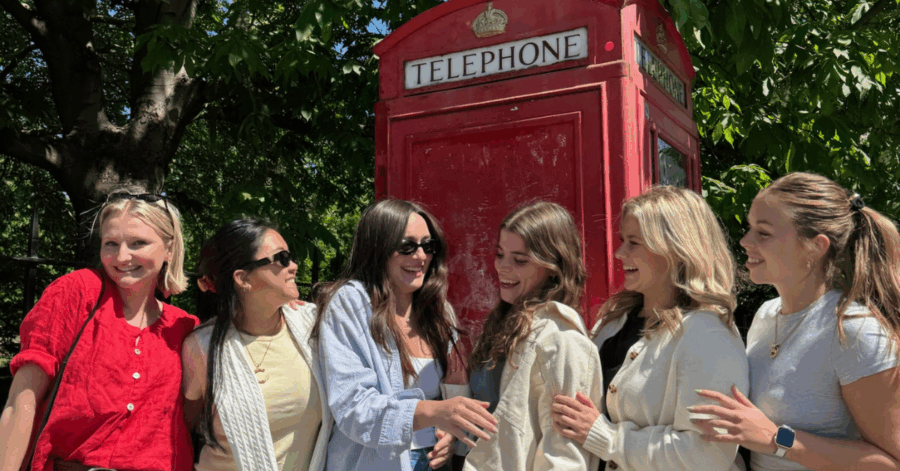Hello, it’s Mykaela again and I am writing to you after safely returning from a weekend in Paris. As a quick refresher, I am doing a Maymester abroad in Cambridge, England studying education, however this weekend I had the pleasure of traveling to Paris to visit my best friend. I know what you’re thinking, is Paris as dreamy as it’s made out to be? In my opinion, YES- everything about Paris screams la vie en rose. The love in the air, in addition to the couture fashion and amazing pastries, made me feel as if I was living out a dream I never knew I’d had. I can’t wait to return to Paris with all my best friends for my dream bachelorette party (just kidding, I’m not engaged)!
Although my weekend trip was a dream come true, some occurrences definitely tested my patience levels and problem-solving skills. I tell you this not to complain or to receive pity, but more to explain how I was led to write about this particular topic for my second blog post. Below, I have four tips that I think will lead to a successful study abroad experience. Note that these are all subjective and based on an experience that I have yet to even complete. In a way, this may just be me finding a way to organize what I’ve learned thus far. Hey, I love lists! Regardless, here are my four tips for study abroad success (whatever that means):
Prepare for unpreparedness:
I know, how contradictory is that?! This tip is definitely for my particularly anal readers who value organization and planning more than about anything else. I am here to say that I am with you, and although these characteristics will benefit us in many places in life, we’ll have to take it down a few thousand notches for study abroad. I am by no means telling you not to prepare, but rather to be ready for things you couldn’t possibly prepare for. A good example of this would be when my laptop screen was mysteriously cracked the day before I left Paris to return to Cambridge. Despite me being the biggest planner I know, there was no way for me to foreshadow for a situation like that and I think that’s okay. With the help of my wonderful family and my support system here in Cambridge, I was able to get my laptop into the Apple store and should be getting it back any day now. In short, go with the flow and allow every experience, even the bad ones, to serve as a chance for growth.
Remain open:
This definitely plays off my first tip; however, this one is geared more towards our perspective of external factors of a study abroad. For this study abroad, all of us students are living in homestays with host families. This has been my first experience with any of that and to be completely honest, it took me a very long time to feel comfortable residing in someone else’s house. My host family has done everything they can to make me feel comfortable and safe in their space, and I now am. However, one of the things holding me back from feeling that way initially was my preconceived perception of what I thought a homestay should be. I think it’s really easy to say you’re open from the comfort of own secure space, whether it be your house, your clothes, or your major. However, to achieve real openness, one must find discomfort. This trip has widened my perspective on so many levels and I think traveling can do the same for anyone if they allow it.
Help-seeking:
I took a course this past semester about learning strategies for undergraduate students and learned of a strategy called “help-seeking.” The strategy basically encourages students to seek support from their peers and professors during times of academic adversity. Coming from such a large university, it is very easy to isolate yourself in your own bubble of life. You find all of your support (academic or not), in your community at UT. However, you unconsciously neglect other communities who could use your support or could share support with you. As mentioned before, my laptop screen was cracked during my weekend in Paris, which left my screen completely ruined and invisible. Additionally, it left me in a state of negative emotion and overwhelming anxiety that felt I had to take on alone. However after a couple of days, I woke up and was tired of letting such a minor situation weigh me down, so I decided to tell my class about my laptop during our morning check-in. After getting everything off my chest, I was welcomed with an overwhelming amount of eagerness to help and emotional support. Whether it was tangible help or just a hug, I really felt supported by a group of people that I didn’t know two weeks ago, which is important this far away from home. Of course, I found support in my community back home, but seeking help from the people currently surrounding me proved to be very beneficial for my mental state. Although I didn’t utilize them, it is important to know there are also external resources that are designed to help students on study abroad programs, however, they’re also reliant on the transparency of the student. My whole point in sharing this is to emphasize the importance of admitting to needing help wherever you go. It takes a lot of transparency, vulnerability, and generosity to open yourself up, specifically to a community of strangers. However, I encourage you to take the leap and allow it to teach you and fulfill you in ways that are longer lasting than the travel itself.
Self-care:
My final tip is one that I find incredibly important in all spaces and it is to take care of yourself. I don’t have a crazy laptop story to go along with this tip, but instead, I leave this one up for interpretation. Self-care comes in many different forms for different people, so I don’t think it would be fair to put a label on how one should take care of themselves. The whole point is that you do it and you do it consistently. Study abroad is exhausting! You’re doing as much work for a course as you would during an entire semester in one month. Additionally, you’re trying to explore a new place, foster friendships, communicate with people back home, eat, sleep, and oh yeah, breath. Not to mention, jet lag is a real thing and will take you out like the plague. I say all of this not to scare you, but to make you aware that none of the tips above are possible without this one. Ensuring that you get the physical, mental, and emotional nourishment and rejuvenation you need for an entire month is the only way you’ll be able to walk away from a study abroad experience with something worth remembering. I personally find comfort in movement, so I have been taking long walks almost every day to clear my mind (and to find Cambridge’s best latte). Whatever your self-care method may be, make sure you do it religiously. You never know, you may find your city’s best latte!
As I mentioned before, these four “tips” have served more as a reflection on what I have learned outside of an academic context while in the UK. I am so honored to have this outlet to share my evolving thoughts with you all and I hope this gives someone else the courage to do the same. Thank you for reading and see you next time!
This post was contributed by Mykaela Johnson, a 2019 Global Ambassador.
Don’t get left behind. Read more about Mykaela’s experience abroad>>










